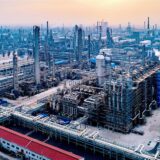With no timeline given, China announces plan to ban petrol and diesel cars
The world’s largest automobile market is studying when to implement a ban on petrol and diesel cars. Xin Guobin, China’s vice minister of industry and information technology, said the government is working on a timetable to end production and sales of these vehicles.
Addressing a car forum in Tianjin, China, over the weekend, Xin said China was considering following in the footsteps of some European countries.
“Many countries have adjusted development strategies … Some countries have worked out a timetable to stop production and sales of traditional-fuel vehicles,” Xin said.
“Now the Ministry of Industry and Information Technology has launched a study as well, and will work with related departments on a timetable for our country,” he said.
China faces an uphill battle to meet its targets of reducing carbon emissions per unit of GDP by 60% to 65% by 2030, and making non-fossil fuels 20% of primary energy consumption, Xin added. The Ministry of Environmental Protection has said that vehicle fumes accounted for more than 80% of China’s carbon monoxide and hydrocarbon emissions and 90% of its nitrogen oxides and particulate matter emissions.
New-energy vehicles and batteries are key parts of Beijing’s plans to turn China into a high-technology powerhouse. But with nearly 200 million registered vehicles by the end of 2016, only 1.09 million or 0.5% are new-energy vehicles.
Chinese consumers accounted for 53% of the 774,000 electric cars sold worldwide in 2016. Industry forecasters estimate that China has to produce 750,000 new-energy vehicles next year to meet market demand.
A total ban on petrol and diesel cars, which is likely to occur after 2040, according to Singapore’s Channel News Asia, in the world’s largest automobile market will help push both local and global automakers to shift toward electric vehicles. The government offers generous subsidies to makers of new-energy vehicles. It also plans to require automakers to earn enough credits or buy them from competitors with a surplus under a new cap-and-trade program for fuel economy and emissions.
The National Development and Reform Commission (NDRC), China’s top planning agency, has also said it will not approve any new fossil-fuel car projects.










